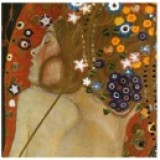Word of the Day: Laugh
-
Jordan
13 years agoLaugh
- noun
-verb
Pronunciation
[laf]
Definition:
- verb
1. to express mirth, pleasure, derision, or nervousness with an audible, vocal expulsion of air from the lungs that can range from a loud burst of sound to a series of quiet chuckles and is usually accompanied by characteristic facial and bodily movements.
2. to experience the emotion so expressed: He laughed inwardly at the scene.
3. to produce a sound resembling human laughter: A coyote laughed in the dark.
- noun
6. the act or sound of laughing; laughter.
7. an expression of mirth, derision, etc., by laughing.
8. Informal . something that provokes laughter, amusement, or ridicule: After all the advance publicity, the prizefight turned out to be a laugh.
Etymology:
O.E. (Anglian) hlaehhan, earlier hlihhan, from P.Gmc. *klakhjanan (cf. O.N. hlaeja, Ger. lachen, Goth. hlahjan), from PIE *klak-, of imitative origin (cf. L. cachinare "to laugh aloud," Skt. kakhati "laughs," O.C.S. chochotati "laugh," Lith. klageti "to cackle," Gk. kakhazein).
The noun is first attested 1680s, from the verb. Meaning "a cause of laughter" is from 1895; ironic use (e.g. that's a laugh) attested from 1930. Nitrous oxide has been called laughing gas since 1842 (for its exhilarating effects). Laugh track "canned laughter on a TV program" is from 1966.
Quote with the word:
"If I coveted nowe to avenge the injuries that you have done me, I myght laughe in my slyve.
- John Daus, "Sleidanes Commentaries," 1560 -
Narphangu
13 years agoInteresting word choice.
-
Jordan
13 years agoSlyve. The closest thing I can find is a Modern English cognate "slive" which means "slip" or sometimes "sneak." Still, though, I ca't fully decifer the phrase so I think maybe it is an obsolete word or the grammar is different/wrong.
-
Narphangu
13 years agoI believe it's "sleeve."
O. Eng. slieve, or slyf, a word allied to slip, cf. Dutch sloof, which would align well with your cognate, Jordan. -
Jordan
13 years agoGood call, love! :)
-
sibyllene
13 years agoThat would seem to make the most sense.
I always think it's fun to try to read Old (or maybe just archaic?) English text. There are cool moments where you realize that, despite the orthography, you can actually understand much of what is written. (I think it's easier to listen to it, admittedly) -
Narphangu
13 years agoUnless you're reading Beowulf... then there's no making sense of it.
That's actually how I feel about reading Russian. Often times, the word looks completely foreign until you sound it out and realize, Oh, it's a parachute! There's a puzzle in every word. :)


